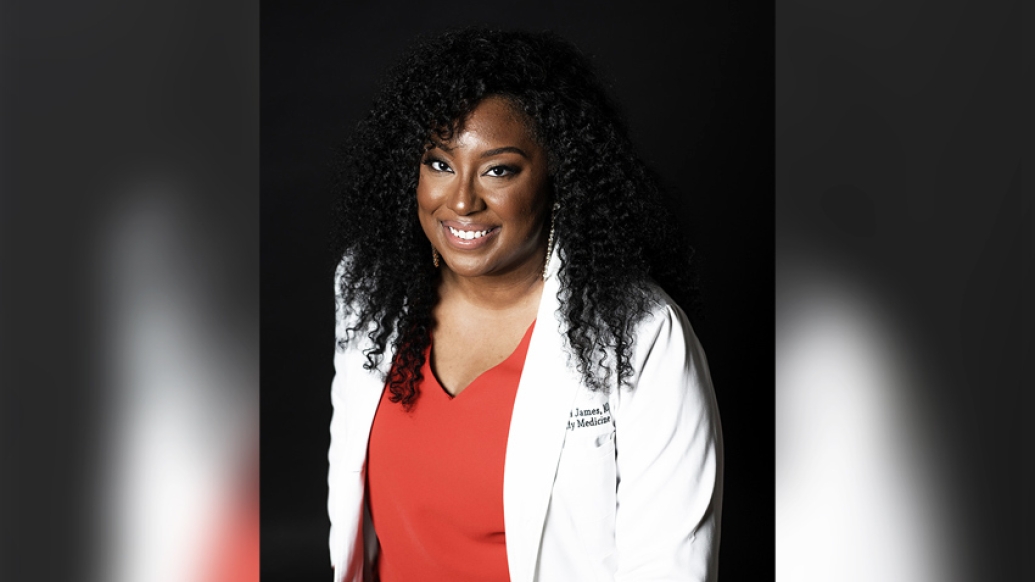Physician Brittani James is here to tell you that antiracism is work for anybody and everybody.
12:18 PM
Author |

For Brittani James, M.D., antiracism work is not just political, it's personal.
The bio on her website ends with a powerful sentence: "Dr. James is a first-generation, slave-descended physician." It's not every day that an accomplished physician brings up her family's history of enslavement. But for James, that history is foundational, not only to her sense of self, but also to her day-to-day work as a physician activist in Chicago.
In the world of antiracism advocacy, James is undoubtedly a rockstar. In 2020, she cofounded with her twin sister, Brandi Jackson, M.D., the Institute for Antiracism in Medicine, an organization that has partnered with the American Medical Association on its strategic plan to embed racial justice within the organization and advance health equity.
Headlines from the frontlines: The power of scientific discovery harnessed and delivered to your inbox every week. Subscribe to the Michigan Health Lab blog newsletter
She has been interviewed on CNN about vaccine hesitancy in the Black community. She has also been featured in the New York Times for starting a petition to hold JAMA accountable after it published a podcast that disavowed structural racism in medicine. On top of all that, she teaches classes on antiracism at the University of Illinois. And that's not even half of it.
Making health care equitable
In her family medicine practice, she serves people who have been hurt by systems of oppression.
"Just about 100% of my patients are black and brown," said James, who is the medical director of the Inner-City Muslim Action Network in Chicago. She cares for many immigrants, some of whom are undocumented, without health insurance, and many who are disproportiantely affected by mental health concerns.
"There's an undercurrent of trauma that really isn't talked about," she said. "'Trauma-informed' is the buzz-word now, [but] our mainstream definitions of trauma don't account for what it does to the psyche on an individual level and a community level to experience, for example, hundreds of years of oppression."
Like Podcasts? Add the Michigan Medicine News Break on Spotify, Apple Podcasts or anywhere you listen to podcasts.
As a family medicine physician serving minoritized groups during the pandemic, James has witnessed "an implosion of factors" on her patients. But she also sees resilience: "people acting, people working to make their communities better."
James believes that no matter one's background or educational experiences, it is everyone's responsibility to make health care equitable.
"There's an overwhelming body of literature documenting racial health disparities from slavery to the present," she said. "We don't need another study to prove this is real. We need policy changes."
One such change she suggests for health care systems is to stop doing implicit bias trainings. For one, she notes that trainings are often short-term and not adequate to address deeply entrenched disparities. She also says the trainings focus on individuals and their unexamined racist ideas.
"That's a real thing, but more importantly, so is structural racism — the way it shapes policies, protocols, and institutional norms," James said.
Addressing antiracism in medicine on a larger scale
James doesn't shy away from self-examination, either.
In 2018, she and her sister cofounded Med Like Me, an organization devoted to helping underrepresented minorities pursue careers in medicine. Although it was a successful pipeline program, James and her sister felt like "we were ushering [the learners] into a hostile climate." After hearing about people's "toxic experiences of academia," James and her sister pivoted to addressing antiracism in medicine on a larger scale.
"I have a responsibility to not drop the ball on moving racial progress forward."
This article as additionally edited by Allison Mi.
Live your healthiest life: Get tips from top experts weekly. Subscribe to the Michigan Health blog newsletter

Explore a variety of healthcare news & stories by visiting the Health Lab home page for more articles.

Department of Communication at Michigan Medicine
Want top health & research news weekly? Sign up for Health Lab’s newsletters today!





